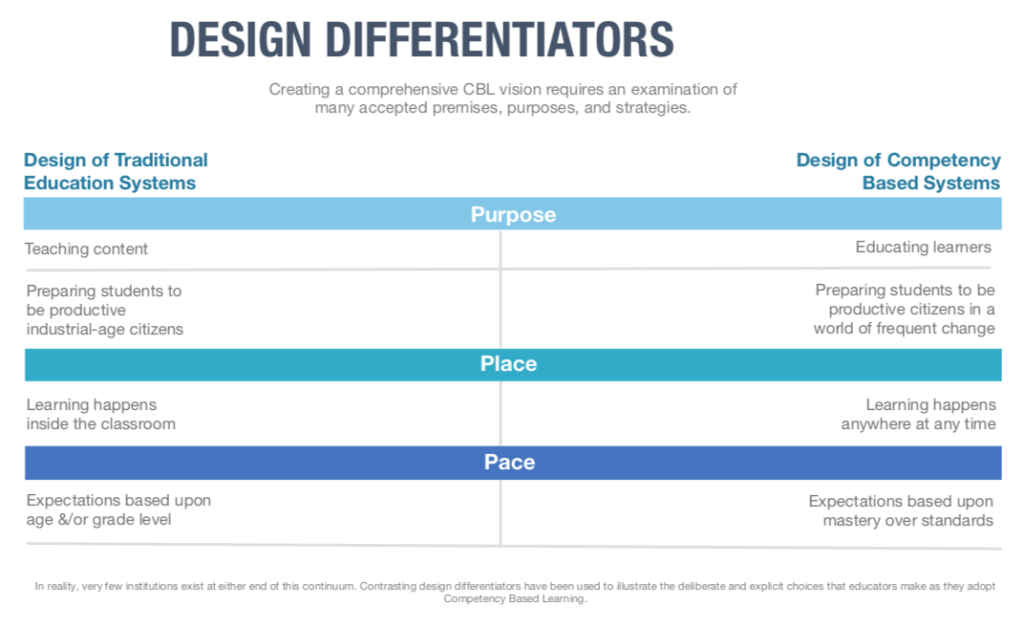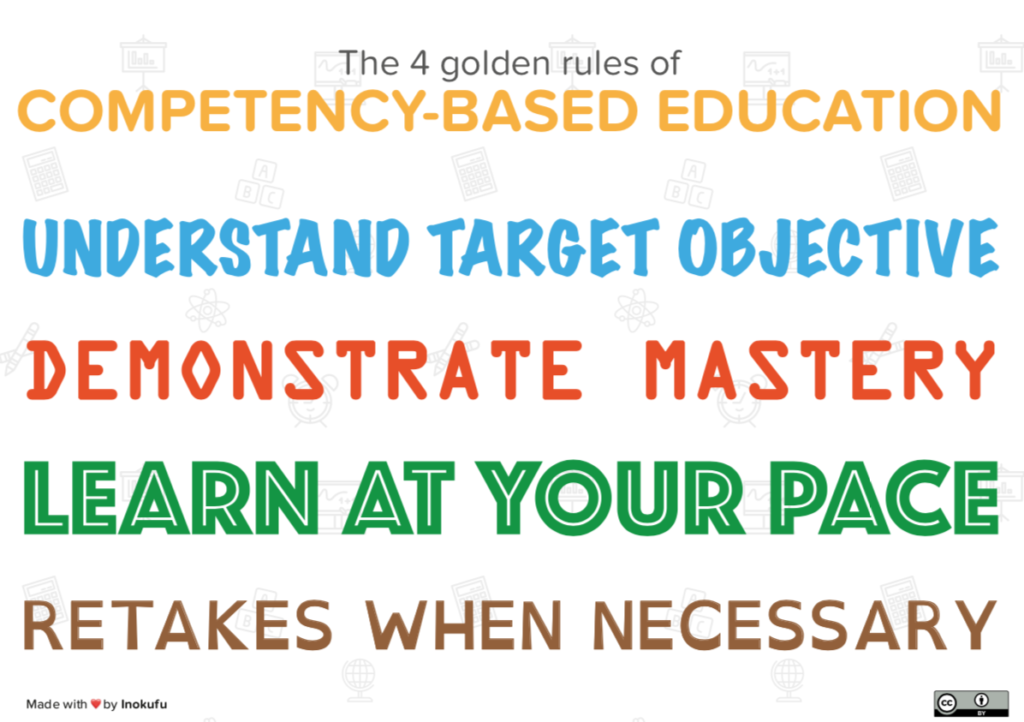Competency-based education (CBE) has been gaining a lot of momentum worldwide as an alternative approach to traditional education system. But what is exactly CBE?
Competency-based education is an approach to teaching and learning focused in learning concrete skills instead of abstract learning.[1]
CBE is known by a few synonyms (Competency-based learning, Proficiency-based education, Mastery-based education) but they all boil down to four key points:
- Target objective (aka the skill to master) must be clearly stated and explained by teacher to students at the beginning of the learning session.
- Students must demonstrate mastery of said target objective. This means that both assessment format and grading system have to be adapted to show and measure this mastery.
- Learning pace must adapt to each student. Time is not a constant (or a constraint) anymore but a variable, since mastery is more important than age or minimum grade requirement.
- Retakes is totally fine and part of the process. This part is key has it removes stigma associated with failure and emphasize the focus on real mastery and not just cramming.
This doesn’t sound groundbreaking to you? Maybe it’s because we have been slowly shifting from traditional education to CBE over the last few years. To better understand where we stand today, take a look at the diagram below. [2]
 Design differentiators between traditional education system and CBE systems [2]
Design differentiators between traditional education system and CBE systems [2]
Take a few minutes to think about your institution or the institutions where you studied. Where are they situated in term of purpose, place and pace? Are they closer to traditional education system ? Are they in the middle?
If you are interested to know more about institutions who have successfully made this transition, the MIT Teaching System Lab has recently released a series of videos about three US high schools who implemented CBE in their curriculum.[3]
A series of videos by MIT Teaching Systems Lab about three US high schools who implemented CBE. [3]
For sure, the road has its challenges from how teachers must adjust to their new role, how students need to be more implied in their own education or even how the parents perceive the new grading system which may significantly differ from what they were used to. [4–5]
As an EdTech startup, we deeply believes in the overall benefits of better education systems and we are actively looking at the needs associated with transiting to CBE. Among all the challenges, we see emerging needs for educational tools that could smoothen the transition to CBE:
- Provide teachers a better overview of the advancement of each student,
- Notify teachers when a student need special attention,
- Assisting teacher by providing students with personalized ressources or activities based on their individual learning needs,
- Assisting teacher by providing students with ressources or activities they can do outside the classroom and at their own pace.
If you have other ideas, comment or question about CBE, feel free to comment below or reach us. We are always happy to discuss about how, together, we could make education better.
Sources
[1] Wikipedia https://en.wikipedia.org/wiki/Competency-based_learning
[2] Peters, Betsy. 2017. “Competency-Based Learning: State of the K-12 US Market.” New Schools Venture Fund, July 2017. A market survey that presents key CBE characteristics, information about US policy, barriers to adoption, the K-12 market in the US, and technology platforms. https://www.newschools.org/wp-content/uploads/2017/07/Competency-based-learning-State-of-the-U.S.-K-12-market.pdf
[3] MIT Teaching Systems Lab, Youtube playlist https://www.youtube.com/watch?v=RschZFj3vHI&list=PL69YeOR1vok-5Z1EEOjA7xKJaX4LJxXQt&index=1
[4] Barshay, Jill. 2018. “Documenting Maine’s Failure to Implement Proficiency-Based Education.” The Hechinger Report, Proof Points, October 22. This article considers a 2018 report by EDC (Education Development Center) on the impact of CBE legislation in Maine, USA. https://hechingerreport.org/documenting-maines-failure-to-implement-proficiency-based-education/
[5] Schwartz, Katrina. 2014. “Going All In: How to Make Competency-Based Learning Work.” Mindshift, KQED, June 16. This article discusses some of the challenges educators in New Hampshire, USA were grappling with as they made a state-wide shift to CBE. https://www.kqed.org/mindshift/35947/going-all-in-how-to-make-competency-based-learning-work



